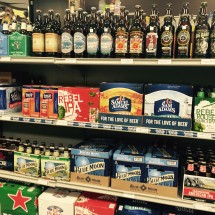Law Offices of John P. Connell, P.C.: In the wake of the ABCC’s recent decision against the Craft Brewers Guild in the so-called “pay-to-play” investigation, another proscribed practice by manufacturers and wholesalers has also been addressed by the regulators: the practice of providing liquor stores with shelf plans or schematics that go beyond just a stand-alone marketing tool.
On February 11, 2016, the Alcohol and Tobacco Tax and Trade Bureau (“TTB”) issued TTB Ruling No. 2016-1 which provided further guidelines as to what breweries, distilleries, wineries and wholesalers are allowed to provide liquor store retailers when it comes to plans or schematics designed to alter the manner in which their alcoholic beverages are arranged on the shelves of their stores.
The TTB Ruling recognized the general rule that, under federal law, Section 105(a)-(d) of the Federal Alcohol Administrative Act (“FAA”) (27 U.S.C. 205(a)-(d)), manufacturers and wholesalers are prohibited from furnishing, giving, lending or selling to a retailer any equipment, fixtures, signs, supplies, money, services or anything of value as an inducement for sales of products to the exclusion of other products on the market. The TTB recognized, however, that since 1995, manufacturers and wholesalers have been permitted pursuant to 27 CFR 6.99(b) to provide retailers with a “recommended shelf plan or shelf schematic,” and that such a practice does not qualify as an “inducement” under Section 105(b)(3) of the FAA.
In issuing its Ruling, the TTB stated that while proposed or recommended shelf plans or schematics are permissible as a stand alone marketing tool recommendation, which the retailer is free to consider or ignore, any of the following acts associated with the provision of such a schematic is strictly prohibited:
- Assuming, in whole or in part, a retailer’s purchasing or pricing decisions, or shelf stocking decisions involving a competitor’s products;
- Receiving and analyzing, on behalf of the retailer, confidential and/or proprietary competitor information;
- Furnishing to the retailer items of value, including market data from their party vendors;
- Providing follow-up services to monitor and revise the schematic where such activity involves an agent or representative of the industry member communicating (on behalf of the retailer) with the retailer’s stores, vendors, representatives, wholesalers, and suppliers concerning daily operational matters (such as store resets, add and delete item lists, advertisements and promotions);
- Furnishing a retailer with human resources to perform merchandising or other functions, with the expectation of stocking, rotation or pricing services of the industry member’s own product.
Of course, included in these proscribed practices would be the manufacturer or wholesaler offering in addition to the shelf design the actual labor or services necessary to clean and reset the retailer’s shelves to conform to the proposed diagram; or the routine maintenance of shelves and coolers by the manufacturer or wholesaler. (See Stein Distributing Company v. Dept. of Treasury, Bureau of Alcohol, Tobacco and Firearms, 779 F. 2d 1407 (9th Cir. 1986).
The TTB issued its Ruling after an investigation of the alcoholic beverages industry revealed a wide spread disregard for the prohibition against offering shelf or cooler design services offered to retailers beyond the mere provision of a shelf design or schematic design recommendation by wholesalers, in particular.
The TTB Ruling also conceded, however, that pursuant to Subpart D of 27 CFR Part 6, certain promotional services provided by manufacturers and wholesalers do remain an exception to those services considered as illegal inducements, and they include the provision to retailers of signs, product displays, point of sale advertising materials and other “limited” promotional items.
© 2016 Law Offices of John P. Connell, P.C.

